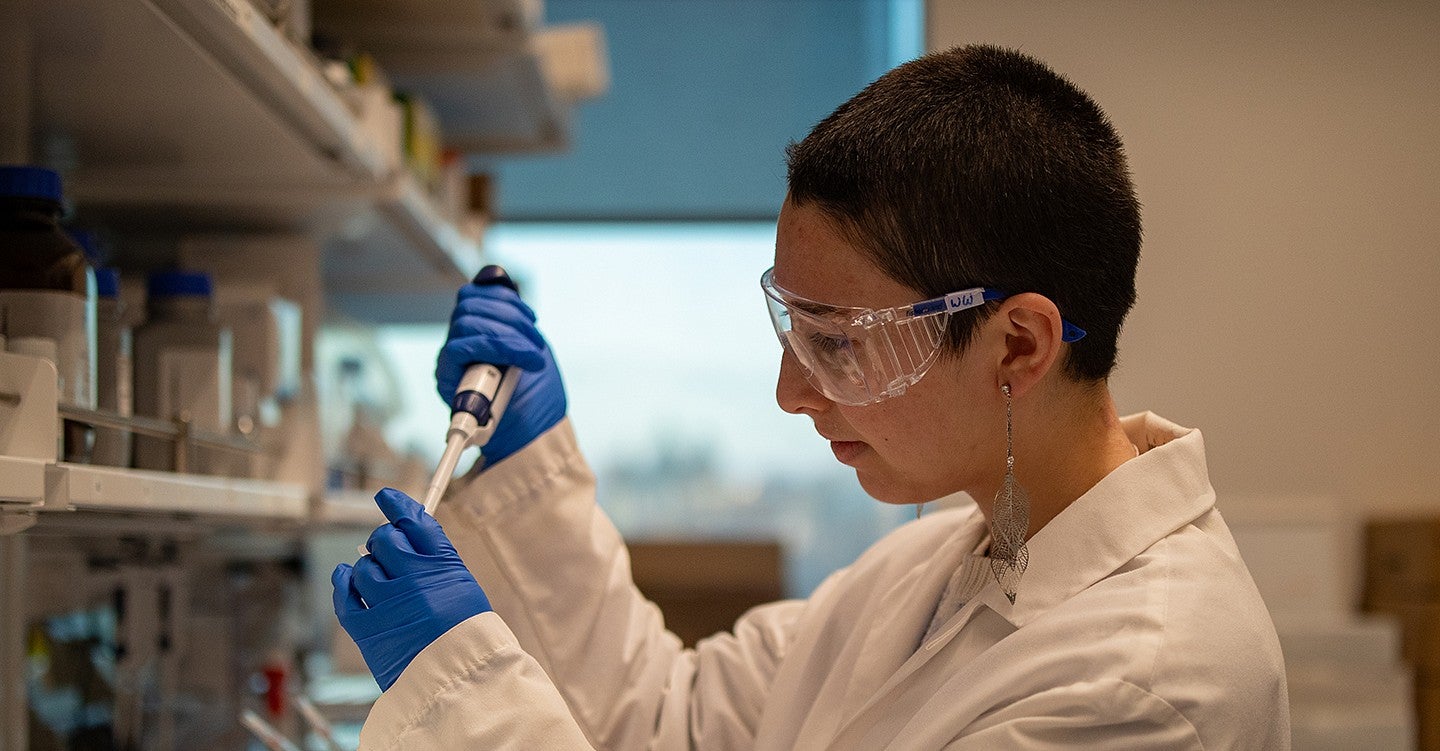
A desire to save the planet
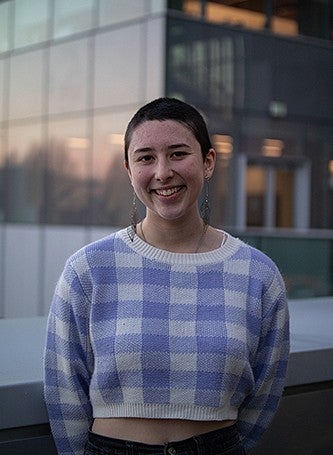
Coffee or tea: Tea
Bucket List Destination: Singapore. The technological advancements of Singapore and the delicious food sound amazing.
Favorite Album: “Wasteland, Baby!” by Hosier
Top Hobby: I have been unicycling for over five years now. I like it because it is a niche skill that not many people can do, and it is also super fun to ride and learn tricks on it.
Favorite CHC Class: My Honors College 101 class, “Introduction to Art Practice.” It was my first Honors College class and it taught me how to view the world in different perspectives through art. It was taught by Liska Chan and it really made me think.
When Waverly Wilson strolled across the King Abdullah University of Science and Technology campus in Saudi Arabia last summer, she was struck by the plush surroundings. Located just north of the lavish port city of Jeddah and overlooking the beaches of the Red Sea, the university sports palm trees, stunning architecture, and the feel of a place pulsing with academic activity.
Wilson remembers walking into the institution’s Coastal and Marine Resources Core Lab, meeting with faculty from around the world and thinking how she could see herself pursuing a career in research.
“Seeing diversity at King Abdullah University was impactful because it demonstrated how science is slowly becoming more inclusive,” says Wilson, who identifies as half Japanese. “And the voices of people from underrepresented groups are being heard.”
The experience was part of a 10-day visit sponsored by the UO’s Knight Campus Undergraduate Scholars Program. The program, which is part of the Phil and Penny Knight Campus for Accelerating Scientific Impact, pairs promising undergraduate students with mentors for a 12-month, comprehensive research experience. The trip to Saudi Arabia was part of that effort.
Wilson is one of 11 Honors College students this year who participated in the Knight Campus program. This year’s cohort had a total of 19 students who conducted research in a range of categories, including biochemistry, physics and bioengineering. Students in the program receive a $16,000 stipend, along with mentoring and other benefits.
A junior who is majoring in chemistry, Wilson says last summer’s visit to Saudi Arabia helped her zero in on a possible career studying marine and environmental science.
“Growing up, hearing all about their environment and also just being out in nature is such an amazing experience,” Waverly says. “Trying to conserve that has always been my passion.”
As part of the Knight program, she has been conducting research on what happens to the P53 cellular pathway during disease states. Wilson believes the work can be applied to different things, specifically saving the environment.
At a recent conference she attended, “one person that I talked to was using protein engineering to look at bacteria in the ocean to see how the proteins influence how the bacteria were able to survive there,” Wilson says. “I would like to do something that combines environmental and protein engineering.”
Pieces of the puzzle
Wilson grew up in Pleasanton, California with her parents and two younger sisters. She spent a lot of time as a kid doing hands-on work with her dad and uncle. She remembers building a catapult to launch pumpkins one year for Thanksgiving. She spent hours drawing sketches, buying hinges from hardware stores, and working in the garage on the contraption.
The family used the catapult to launch pumpkins at an inflatable snowman they had purchased. “Doing that was a blast, just getting all the materials and putting it together,” Wilson says. “The experience was memorable because I was able to learn the steps of using materials to create something.”
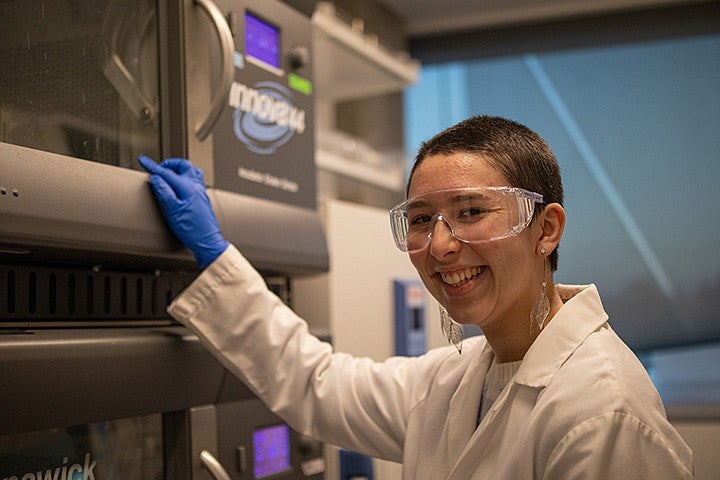
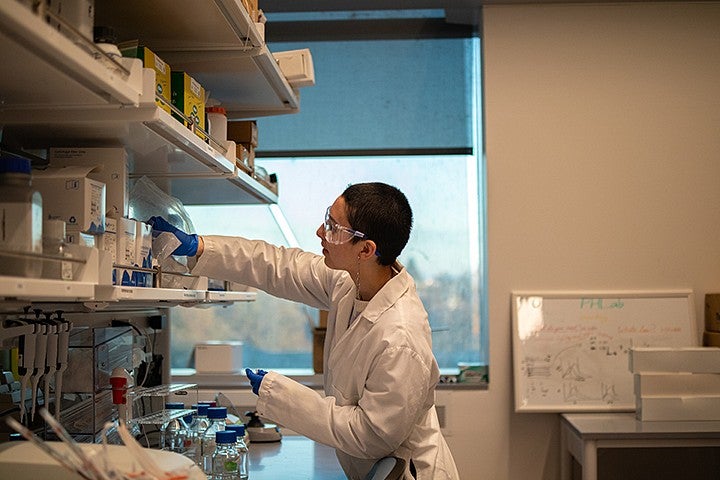
In elementary school, she loved science and learned about the importance of teamwork. She remembers in one class how a teacher asked students to build a cardboard maze that a textbook could get through. She worked with her dad to create her portion and remembers how the students worked together to finish it. “It was a way of bringing people together,” Wilson says.
Completing collaborative projects that felt like solving puzzles marked some of her most memorable moments. Her uncle, who was frequently around and worked in microbiology, pushed her to think beyond the projects. His actions inspire her work today.
“My uncle does pharmaceutical research, and it was inspiring having someone who worked in the science field to look up to,” Wilson says. “I was constantly hearing about stories of the organic chemistry lab and the crazy synthesis he had to do in college, so it’s cool being in an organic chemistry lab now and being able to relate to what he talks about.”
In high school, Wilson started taking biotechnology courses, something not often offered at the high school level. She was interested in environmental conservation and decided to write a paper on light pollution’s impacts on wildlife.
She examined how light pollution affects Terdus merula, the common species of blackbird found in Germany. “Through my extended essay, I got a chance to explore how interconnected science really is,” Wilson recalls. “It definitely solidified my passion. There are also so many ways to apply science to help individuals and the environment. I felt like it was my calling.”
“I got a chance to explore how interconnected science really is. It definitely solidified my passion. There are also so many ways to apply science to help individuals and the environment. I felt like it was my calling.”
Computing her path
As Wilson began her college career, she wasn’t sure about an area of focus. But she knew it was important to land in a setting that gave her a sense of being part of a community. She became an intern for both the Japanese Student Organization and the International Student Association. Being half Japanese, she was looking to find a community of people with shared experiences.
She was selected to participate in a summer program at a lab at North Carolina State University after freshman year, conducting research focused on how microgravity and heat stressors affect plants. “I remember coming in and they were talking about PPIs and PAEs and PCs, and I was like, ‘I don’t know what’s happening,’” she says.
Wilson realized at the time that every lab is unique, and being a part of lab research doesn’t have to be intimidating as long as you feel comfortable asking for help. She learned from the experience to rely on her peers and mentors.
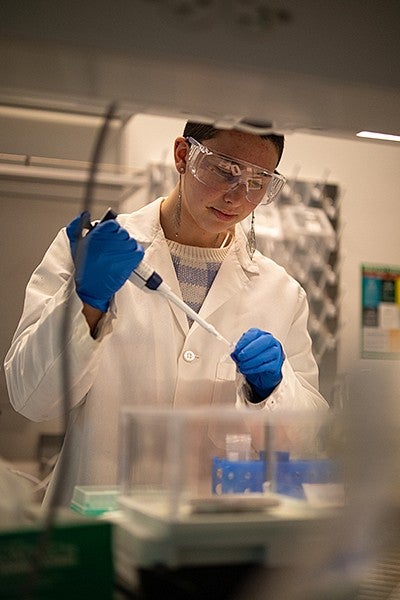
The principal investigator from North Carolina State encouraged her to apply for the Knight Scholars Undergraduate Scholars Program. She joined the Hosseinzadeh Lab at the Knight Campus for Accelerating Scientific Impact and developed an interest in computational research.
“It has to do with a lot of problem-solving,” Wilson says. “It can be done from anywhere, and I’m actually able to design and simulate proteins before even ordering them.”
Wilson is now computationally designing inhibitors for three proteins that are part of the P53 pathway. It’s helping show how the pathway shifts when the proteins get removed, modeling disease states. She has been working on the project alongside her mentor, Cassandra Gonzalez, to complete all three inhibitors.
Gonzalez is a role model for Wilson, not just in the lab. “She’s guiding me and teaching me about everything that has to do with the research, but also teaching me about what it’s like to be a queer woman in STEM,” Wilson says. “She has inspired me to embrace who I am and not be afraid of judgment in the workplace.”
Wilson says her visit to Saudi Arabia last summer opened the door to more possibilities. She says she is considering King Abdullah University as a place to pursue graduate studies, along with institutions in British Columbia and Spain.
As she closes out her experience with the Knight Campus program, she feels a sense of accomplishment in the work she’s done and in her personal development.
“I’ve grown a lot as a person,” Wilson says. “I’m definitely continuing my time in the lab. I want to be able to use science to make a positive impact on the world. I am very interested in environmental research and using my skills for scientific discoveries to help the environment.”
